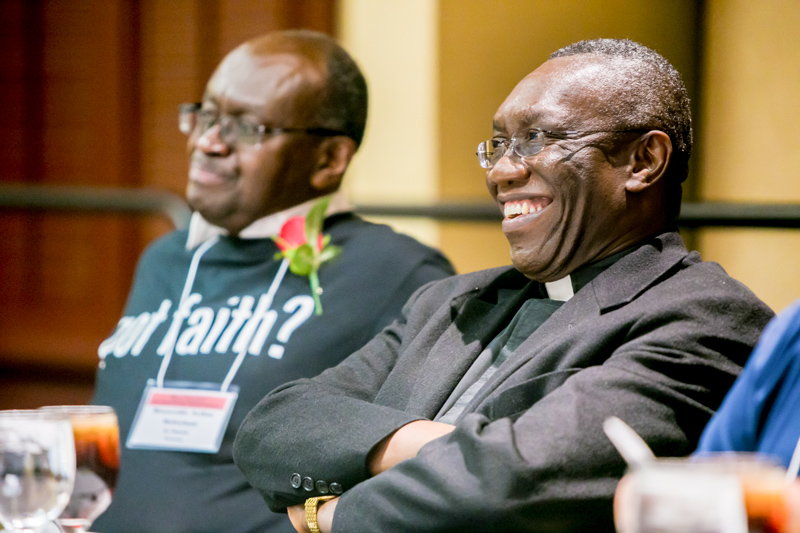
COLUMBIA—“Strengthening the African American Family,” the theme for the 2015 Black Catholics’ Heritage Celebration, can find its roots in the history books and beyond, where role models of Catholic faith and family are plentiful.
At the celebration Dec. 12 at Embassy Suites, the story of Father Augustus Tolton and the effort to elevate his legacy to sainthood resonated with the audience and offered an example of a strong family combatting the generations-old struggles of African American families.
“Augustus Tolton emerges quietly and practically unnoticed in the pages of American history from the backdrop of the ravages of slavery,” said Auxiliary Bishop Joseph N. Perry, of Chicago, the event’s keynote speaker. “He was the first link in a long chain of a few gifted black men ordained to the priesthood of Jesus Christ in this country.”
Father Tolton, born in 1853 in Missouri, was the first acknowledged ordained priest of African descent. His father, Peter Paul, was one of the first slaves to join the Union Army in the early days of the Civil War, but died before it ended. Soon after, Tolton’s mother, Martha Jane, led her family on a 43-mile journey out of Missouri, across the Mississippi River on a rowboat with a single oar, to Quincy, Ill., where other slaves had taken freedom.

In Quincy, in between shifts at the tobacco plant where Martha Jane and her family worked, she insisted Augustus get an education. A local Irish priest befriended the family and enrolled Augustus in St. Peter school, where he received his first holy Communion.
“In the quiet recesses of St. Peter’s parish, Augustus spoke to God and God spoke to him,” Bishop Perry said.
Tutored by the Notre Dame Sisters and Franciscan Fathers, Tolton earned a scholarship to Quincy College, where he nurtured the hope of becoming an ordained priest, despite the fact that seminaries in those days did not accept black students.
Eight years later, Tolton was admitted to a seminary in Rome and was ordained in 1886.
“If it wasn’t for his mother, Martha, Augustus Tolton would have been just one of among countless courageous black men who faded into history unknown,” Bishop Perry said. “But Martha’s daring escape from bondage launched her son into history as a pioneer of ministry turned toward the church’s black children.”
Father Tolton was assigned to Chicago and oversaw the construction of a church for black Catholics on the city’s South Side. That church, St. Monica’s, would eventually become a national parish.
On July 9, 1897, during a brutal heat wave, Father Tolton collapsed while walking to the rectory and died about eight hours later.

In January 2010, Bishop Perry was appointed to oversee the process to canonize Father Tolton by the late Cardinal Francis George, Archbishop Emeritus of Chicago.
Bishop Perry said it took more than four years of research and investigation into the life, virtues and reputation of Father Tolton to support the Cause of Sainthood. In Sept. 2014, copies of the supporting documents were sent to Rome, where they will be reviewed by a panel of cardinals who will make a recommendation to the pope.
“We hope the church authorities will soon approve of Tolton’s witness and virtuous life and name him a saint at the altar,” Bishop Perry said.
He estimates there are about 190 priests of African American descent, but none are currently assigned to the Diocese of Charleston.
“I would love to see more and more people coming from our minority communities,” said Bishop Robert E. Guglielmone. “We’re not getting vocations to priesthood and religious life from these groups. It’s not going to happen unless family life is strengthened.”
The bishop said vocations come from the strength of family.
“Father Tolton’s life is a perfect example of that; the way his mother kept that family together and strengthened the family and kept them connected with the Church. That’s how Tolton’s vocation was developed. I think we have to do the same thing here,” he said.
By Chip Lupo | Special to The Miscellany
Photos by Jeff Blake/Miscellany

